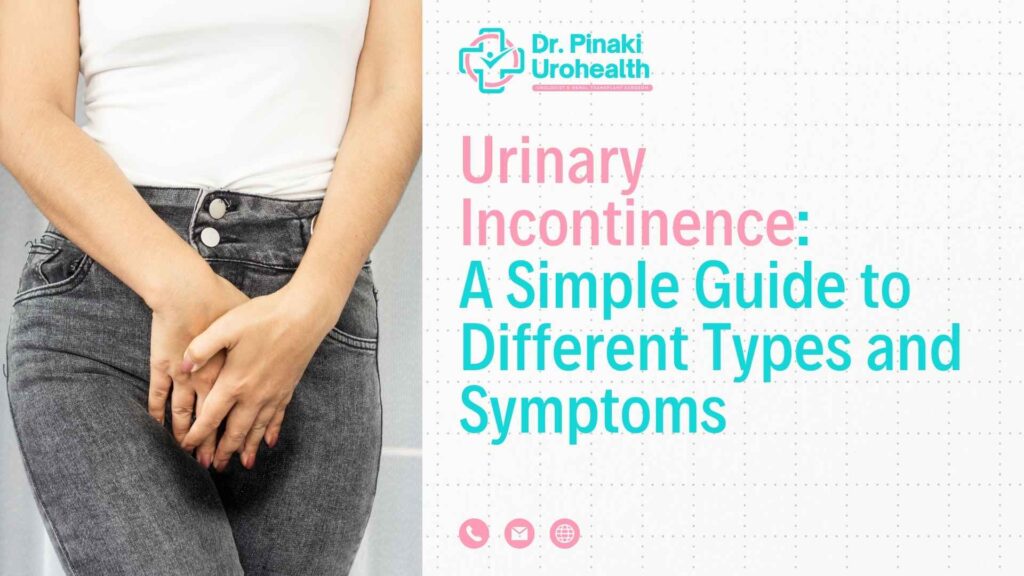Urinary incontinence, a condition marked by involuntary leakage of urine, can be a distressing and embarrassing problem. While it’s a common issue, many people hesitate to discuss it with their healthcare provider. It’s important to understand that incontinence is treatable, and seeking help can significantly improve your quality of life.
In this article, we’ll delve into the different types of urinary incontinence, their symptoms, and when it’s time to seek medical advice. By understanding the nuances of this condition, you can take steps to manage it effectively.
Understanding the Different Types of Urinary Incontinence
Stress Incontinence
Stress incontinence occurs when physical activity or stress, such as coughing, sneezing, or lifting heavy objects, puts pressure on your bladder, causing urine leakage. It’s more common in women, especially after childbirth or menopause, as weakened pelvic floor muscles can contribute to this condition.
If you experience accidental urine loss during physical exertion, it’s likely a sign of stress incontinence.
Urge Incontinence
Urge incontinence is characterized by a sudden, urgent need to urinate, often followed by involuntary leakage. This urgent sensation can be triggered by various factors, including bladder irritation, nerve damage, or certain medications.
If you find yourself frequently rushing to the bathroom, experiencing nighttime awakenings, or having accidents before reaching the toilet, you may be dealing with urge incontinence.
Overflow Incontinence
Overflow incontinence occurs when your bladder doesn’t empty completely, leading to frequent, small leaks. This often happens when the bladder muscle is weak or there’s a blockage, such as an enlarged prostate in men.
If you experience a weak urine stream, a feeling of incomplete bladder emptying, or constant dribbling, you may have overflow incontinence.
Common Symptoms of Urinary Incontinence
While the specific symptoms can vary depending on the type of incontinence, here are some common signs:
- Accidental urine leakage: This is the primary symptom of incontinence.
- Frequent urination: You may need to urinate more often than usual, especially at night.
- Urgent need to urinate: A sudden, strong urge to urinate that’s difficult to resist.
- Weak urine stream: Difficulty starting or stopping the urine flow.
- Nighttime awakenings: Waking up multiple times during the night to urinate.
- Feeling of incomplete bladder emptying: A sensation that your bladder isn’t fully empty after urinating.
When to Seek Medical Advice
While mild incontinence may not significantly impact your daily life, it’s important to consult your healthcare provider if:
- Incontinence significantly affects your quality of life: If it limits your social activities, work, or sleep, it’s time to seek professional help.
- You experience sudden changes in bladder control: Any abrupt changes in your bladder habits, such as increased frequency or urgency, should be evaluated by a healthcare professional.
- You have other urinary symptoms: If you experience pain, blood in the urine, or other concerning symptoms, it’s essential to consult a doctor.
By seeking timely medical advice, you can receive an accurate diagnosis and appropriate treatment plan.
Conclusion
Understanding the different types of urinary incontinence is crucial for effective management. By recognizing the symptoms and seeking timely medical advice, you can take control of your bladder health. Remember, incontinence is a treatable condition. With proper diagnosis and treatment, you can significantly improve your quality of life.
If you’re experiencing any symptoms of urinary incontinence, don’t hesitate to schedule a consultation with me. I can help you understand your condition and develop a personalized treatment plan to improve your quality of life.
Frequently Asked Questions About Urinary Incontinence
Q: What are the common causes of urinary incontinence?
A: The causes of urinary incontinence can vary depending on the type. Some common causes include:
- Weakened pelvic floor muscles: This is a common cause of stress incontinence, especially in women after childbirth or menopause.
- Overactive bladder: This condition can lead to urge incontinence, causing frequent and urgent urination.
- Neurological disorders: Conditions like stroke, Parkinson’s disease, or multiple sclerosis can affect bladder control.
- Prostate problems: In men, an enlarged prostate or prostate surgery can contribute to urinary incontinence.
- Medications: Certain medications can affect bladder function.
Q: Can urinary incontinence be cured?
A: While there’s no definitive cure for urinary incontinence, many effective treatments can significantly improve symptoms and quality of life. The best approach depends on the underlying cause and severity of the condition. Treatment options may include lifestyle modifications, pelvic floor exercises, medications, or surgical procedures.
Q: Are there any home remedies for urinary incontinence?
A: While home remedies may not completely cure incontinence, they can help manage symptoms. Here are some tips:
- Pelvic floor exercises: These exercises can strengthen the pelvic floor muscles, improving bladder control.
- Bladder training: This technique involves gradually increasing the time between bathroom trips to improve bladder control.
- Dietary modifications: Limiting caffeine and alcohol intake can help reduce bladder irritation.
- Weight management: Losing excess weight can reduce pressure on the bladder.
Q: Is urinary incontinence embarrassing?
A: Many people feel embarrassed about urinary incontinence, but it’s important to remember that it’s a common condition that can affect people of all ages and genders. By seeking medical advice and discussing your concerns with your healthcare provider, you can find effective solutions and regain your confidence.
Q: Can I still have a normal sex life with urinary incontinence?
A: Yes, you can still enjoy a fulfilling sex life with urinary incontinence. By discussing your concerns with your partner and healthcare provider, you can find strategies to manage your condition and maintain intimacy.

